
When Dustin Lance Black landed in western Michigan in August to begin production What’s Wrong With Virginia, a secondary project emerged: Working with students at nearby Hope College to host a Milk screening. But then the college’s dean of students called the screening, and a separate Q&A, not “educational” enough for campus, and banned Black’s event, effectively squashing the effort, as we reported in October. But two weeks ago, Black did hold that screening. And he also had a sit-down with that dean.
It’s the type of fight-the-man story that’s fitting for, well, a screenplay. Or at least a short story — which Black delivered on The Daily Beast.

I don’t think the town was homophobic. I think they had simply never discussed gay rights openly before, and here I was, an interloper, threatening to thrust this hot-button issue into their community. As the dean kept talking and students began protesting, calls came from journalists in Los Angeles, San Francisco, and New York. I did my best to stay focused, wrap up production, and in the end, decided to move my editing room out of West Michigan.
But that’s not how the story ends. Two weeks ago, in blizzard conditions, a Delta pilot landed on a snowy runway in Grand Rapids, and I drove the half hour from the airport to Holland, watching SUVs slide into ditches in front of me. With five minutes to spare, I arrived at the Park Theater off Main Street, right across from the steeples of Hope College.
Why had I made the journey back? Because when I decided I needed to set things right with the people of Holland who had been so welcoming, I called that same student who had come up to me in the coffee shop months ago, and we decided not to take “no” for an answer.
He organized a new group called “Hope Is Ready,” and raised funds from local city leaders who had never taken a stand on gay rights before, but in the face of Hope’s now widely publicized homophobia, decided to put their quiet courtesy aside (most for the first time), and donated time, money, and space to do what Hope wouldn’t: have this conversation.
The theater sold out in an hour. We booked a second night at a larger venue and it, too, filled up. As the film wrapped up, Harvey called out from the screen: “You gotta give ‘em HOPE. You gotta give ‘em HOPE.” And for the first time, those words meant something very different to me. They meant, as we fight for equality in California and New York, we can’t forget about those kids out there in small-town America, in the Hollands or Hope Colleges. Their lives are too valuable.
So what about Richard Frost, the dean (who, curiously, Black doesn’t mention by name)? Black says the day after the screening, Frost called him, saying he wanted to meet.
A tall, white-haired man waved to me from under the marquee of another local theater. It had warmed up to 20 degrees. I was shivering; he was braver about the weather. This was the man who had banned my film and lecture, and denounced me to reporters. Now he was responsible for my return. Without him, I likely would have spoken to a handful of students on campus, the event would have gone largely unnoticed, and the long-needed dialogue that had taken place the night before would never have happened. Gay people in Holland had this man to thank.
What struck me immediately was his referring to me as “you people.” I asked him to clarify, and he hesitantly said, “gay people.” He claimed it was “my people” who had been attacking him since the news broke, though all of the complaints I’d read in the papers had come from straight people in his own community. But I didn’t argue that. Instead, I asked that he get to know gay and lesbian people individually instead of lumping us together, stereotyping. He agreed, but again used that phrase: “You people.” When I asked him to clarify again, he said, “You Hollywood people.” I assured him that, like gay people, Hollywood folks are also a diverse bunch. But it popped out again: “You people.” This time he wasn’t talking about Hollywood or gay people—this time it was “California people.”
It became clear the problem here wasn’t gay people or Hollywood people or people from California. The problem was a fear of “other” people, people from different worlds or with different viewpoints. I was reminded of Harvey Milk who claimed the war against homophobia was a war against fear. Fear of the unknown. Fear of what is different.
So when the dean asked what we could do to move past this, the answer was clear. Fear and understanding can’t coexist. One devours the other. Students at his college had formed a Gay-Straight Alliance some time ago, but he had refused to recognize it. I told him it was time to officially support that group and allow a dialogue between gay and straight people on his campus. Because as Harvey Milk said so long ago, telling our personal stories is the only way to educate, to reach out and dispel those myths and fears that this dean was still holding onto.
He didn’t promise to do so… but he never said no.

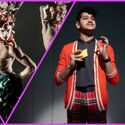
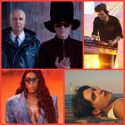
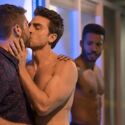
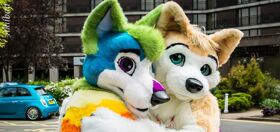

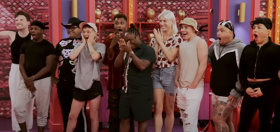

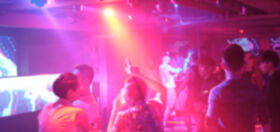
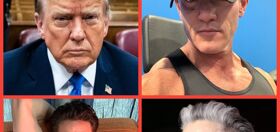

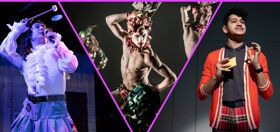

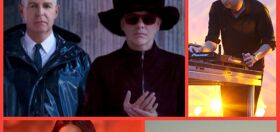






Josh NYC
Conversation works. Politics does not. We should be talking more.
terrwill
I heard it was BARELY attended………
I’m glad they didn’t BACK off the meeting………..
: P
Marcus Brooklyn
Terrwill: S T U P I D
terrwill
Marcus Brooklyn: N O S E N S E O F H U M O R
Bill
^ ^ ^ ^ ^
Both of you. Shut the fuck up.
terrwill
No. 5 · Bill: Stay the fuck out of our pissin’ match!! : P Jeeze is every single poster on the freakin rag today on Queerts????
PootieTang
what was this film about, barebacking? i hear this guy Black is an expert on it…
John from England(used to be just John but there are other John's)
@ PootieTang
Yes it was about Barebacking. But regarding only gays-as gay men are the only people who spread Aids and STD’s.
Straights don’t. They are pure. Which is why you won’t here any hysteria on the subject in well, any blog abouta slutty gal or guy.
Tonyboy
I hope none of the students slept with Dustin Bareback and taped it. That seems to be Dustin’s favorite genre of film.
John from England(used to be just John but there are other John's)
@ Tonyboy
But they did.
And it is.
Send us your link to complain because I for onw, would rather be stabbed to death, than fucking see some ‘writer’ sleep with some gay without protection.
Your like me.
We liked it our gay world without this duffus who wrote the screen play for MILK.
MILK sucks.
Could anyone do that?? YEAH!! Why did it take sooooo long?? Money, names….
BUT WTF does that mean?
Oh…erm…maybe it’s more ipactful to fight a cause the straights are trying to destroy, than say, be like…
FakeName
Apostrophes are not used for plurals.
That is all.
Ten in My Timbz
Hopefully Dustin Lance Bareback used condoms.
The white WeHo and Chelsea circuit gays are so very messy.
Oh and the flyover “Hi may I help yous” at who work at Linens N Things? Even messier.
Sam
“And then we got coffee, which reminded me of this time Harvey Milk said…”
Is this dude just going to name drop Harvey Milk every other sentence for the rest of his life? ‘Cause that’s gonna get seriously annoying.
Alexander
Wow. Lots of haters up in this story. Did DLB write a great movie about a great man? Yeah, he did. It was a critical and mainstream success. Is he an advocate for gay rights, a man who has done more for LGBT people than any of us combined? Certainly. However, all YOU can focus on is one bare-backing video he made years before he was famous with his then-boyfriend. Is one lapse in judgment a sudden condemnation of all of his motives? If so, then none of us have the right to any of our successes.
Sam
@Alexander: “Is he an advocate for gay rights, a man who has done more for LGBT people than any of us combined? Certainly.”
Speak for yourself, sister.
Xavier Dereon
Alexander = Typical star struck messy self important white gay flyover queen
I’ll bet you say “Hi may I help you” at work, too, hmmm?
Just a thought, hon. Just a thought.